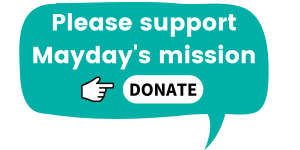A Tale of Two Funders
Pat McArdle, CEO of Mayday Trust, looks at the impact of two very different funding approaches and asks if we are really able to deliver a truly person-led approach in the current climate?
Maria had been a street drinker for many years so, at first, she found it strange to talk about her interests. But her PTS Coach discovered that art was something that she had enjoyed in the past. Her PTS Coach said she had never known much about art before so Maria decided to teach her, hoping they could visit some galleries together.
Maria loved sharing her knowledge and instead of feeling out of control, she felt useful and enjoyed looking at art books, visiting galleries and encouraging her PTS Coach, whose interest in the topic was growing with Maria’s enthusiasm.
Maria’s Coach encouraged her to use all of this learning and attend a series of talks and discussions. Maria was nervous about going so had a few drinks on the way to steady her nerves. Going to an event like this was a big step but it was worth it – she met new people and it helped her to start to thinking differently about herself.
As a result of her interest in art, Maria reduced her drinking, made contact with her family and started to look to the future.
What happens next is a tale of two funders. It illustrates that if relational approaches are to succeed they need to be given wider respect and greater value by the current system.
Funder One:
The first funder was interested in Mayday’s new approach to getting people out of homeless services and decided to come to meet Maria and her Coach. A pleasant hour was spent chatting in a coffee shop. The funder then met the Coaching Team to get under the skin of what purposeful, meaningful yet ‘normal’ chats achieve and debate how power dynamics impact on truly person-led work. ‘The minute you introduce a form the dynamic changes’ says one of the group. Mayday’s Person-led, Transitional and Strength-based (PTS) Response was explained and the funder promised to keep in touch.
Funder one made a clear commitment to fund innovation, a proof of concept, which meant the funding came as a core grant with no outputs but outcomes based on a theory of change. Our belief was that if we implement a relational approach, the by-product will be people moving out of homelessness and not coming back. People start to feel ‘normal’ again after years of jumping through hoops and becoming institutionalised. People will start to gain some hope through trusted connections and finally taking control of their own lives ultimately proving that when given the chance, people were doing it for themselves.
The approach with the funder was equally relational, built on conversations and trust. For the organisation this meant less time spent on producing reports or in meetings discussing how to meet funder requirements. Instead, there was a willingness to be open and honest, share the successes, failures and learning rather than box ticking and spinning a good story. The experience showed how the production of meaningless data has become an art form in the sector, and how focusing on real world discussions resulted in greater social impact.
For the PTS Coach Team it was motivational. The funder was interested in and valued their grassroots experience, warts and all, and this was unusual.
But the biggest impact was on Maria. There were no restrictions on the time she spent with her Coach as it was led by her. There were no more weekly key working as she was in control. This was her first relationship where she didn’t have to talk about her drinking. What Maria and her Coach talked about when they met was up to her. She was allowed to relax and even have fun. Maria was a person, not a client or service user. She began to gain confidence from this and for the first time in a long time, she could take control and make life better for herself.
Funder Two
The second funder was a statutory funder and Mayday had won a contract to deliver services within a homeless pathway. Despite sustaining her accommodation and reducing her drinking, Maria was still viewed by the pathway as having ‘complex needs’. As a result Maria wasn’t allowed to move on and take control of her life.
Funder two had a prescribed programme meaning that people could only stay in their accommodation for a certain period of time after which they had to move along the set pathway. The contract had an element of payment by results, which was related to moving people on. As part of the pathway Maria was offered to progress to the next step, which she would have to do to achieve independence.
However, the offer made to Maria was conditional; she would have to attend a drug and alcohol agency at a place she had previously attended and where she had failed to give up drinking on more than one occasion. Maria saw this as a backward step and, with Mayday’s support, she refused to move. It was hard to find private rented accommodation and while Maria coped positively with the day to day struggles of living with other street drinkers, Mayday lost out financially on their payment by results contract.
The staff felt under pressure due to the requirements of the contract. No matter how ‘person led’ Mayday was as an organisation, the fear of a failing contract combined with the demands of the job, were too much and staff turnover increased. The learning was obvious; this was the cost of entering into such a contract.
We didn’t understand how other organisations were meeting the requirements of the rigid contract but the reality was that they weren’t. People were talking about ‘being creative’. One example of this creativity was a person being evicted after the payment by result period was up, despite the fact that he had nowhere to go. It had become a ‘contract/service led’ game.
As the Senior Management Team we had the responsibility of building staff’s hopes and expectations of being person led. We could see the frustrations the constraints of the contract caused and shared this with staff. But the worst part of this experience was visiting the house where Maria remained and seeing that we had failed to build on the hope that we had ignited within her. We failed to deliver on a secure, safe place she could call home and extend her network of positive connections away from the street.
Despite Mayday failing to meet the target to move Maria on, the relationship with the funder was positive and Mayday, as always, was open and honest. However, the intentions of these discussions from the funder perspective were clear; discussions were about actions to meet the requirements of the contract and not how the contract could change to ensure a person led service.
The Challenge
The task ahead of us is how to embed and scale appropriate relational based commissioning. We have many thoughts on how to make this happen without needing more time or resources. But the first thing we need is for all of us to have the will and desire. We need to stop the game playing and call it out for what it is. None of us are currently able to be truly person-led, to empower people, or deliver strength-based work. It’s just not possible within a deficit-based and contract/data led system.
So let’s call this spade a spade; the problem of ending homelessness isn’t those people categorised with having ‘complex needs’ but the systemic institutionalisation of people who become homeless within a failing system.
Maria is ready to move to a home and enjoy her life, but the barriers created by the system aren’t allowing her to get there.


